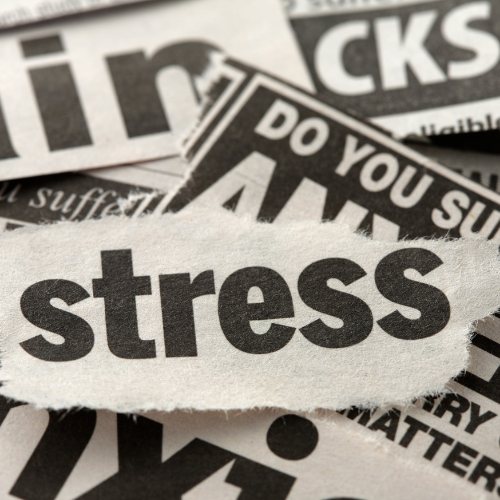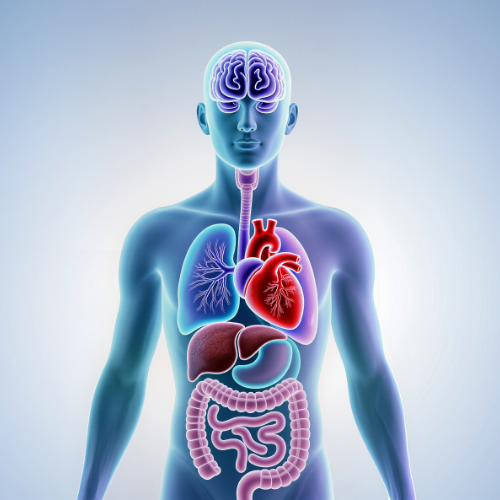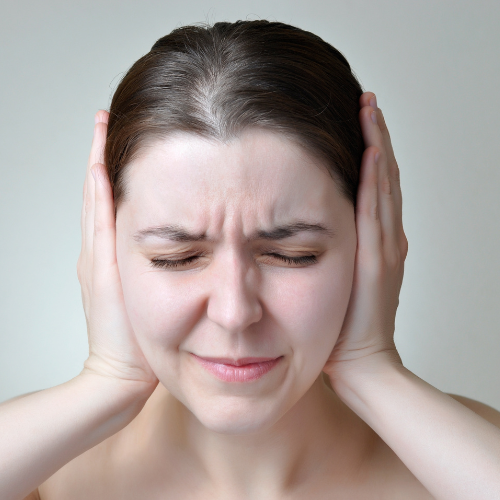Is Stress Hijacking Your Hormones?
Stress is often described as an emotional experience.
Feeling overwhelmed.
Feeling pressured.
Feeling like there’s never quite enough time.
But inside the body, stress is not a feeling. It is a hormonal event. Whether or not we consciously register stress, our hormones respond to it constantly by adjusting metabolism, energy availability, immune activity, sleep depth, and even how safe the body feels from moment to moment. At the center of this response is cortisol.
Your Heartbeat Is a Longevity Signal. Here’s How to Strengthen It
When most people think about heart health, they focus on crisis prevention. Heart attacks. High blood pressure. Cholesterol numbers. A single moment in the future when something “goes wrong.” But from a physiology and longevity perspective, your heart is not a device you monitor only when it malfunctions. It is a continuously responsive organ that reflects how well your entire system is adapting to life.
Your heartbeat conveys information about your nervous system, hormonal balance, metabolic flexibility, sleep quality, and cumulative stress load. In other words, your heart is not only a pump. It’s a signal. And when we learn to interpret and support that signal, cardiovascular health stops being a distant outcome and becomes a daily, trainable capacity. This is where longevity science has shifted in recent years… away from isolated markers and toward patterns of adaptability, resilience, and recovery.
How to Start Your Day Calm, Not Chaotic
For many people, mornings quietly set the tone for the entire day.
Not because of what gets accomplished, but because of how the nervous system is engaged in those first moments of waking. A rushed start, even a subtle one, can create a sense of urgency that lingers well into the afternoon. A steadier start often creates more space than expected, even on busy days.
By late January, this becomes especially noticeable. The initial push to “get back into routine” has passed, and what’s left is reality. Work demands are real. Family needs don’t disappear. Energy may be improving, but it still feels finite.
This is where morning routines often get misunderstood.
A resilient morning routine is not about doing more before 9 a.m. It’s not about optimization or discipline. It’s about how the body transitions from rest into engagement, and whether that transition supports steadiness or reinforces stress.
This article explores what actually makes a morning routine resilient, why calm matters more than control, and how to shape mornings to support energy rather than drain it.
Moving from Crash Recovery to Sustainable Energy
For many people, January begins in recovery mode.
There’s a quiet awareness that energy dipped too low at some point last year. Maybe it happened slowly. Maybe it followed a specific season of overextension. Either way, the body is no longer interested in being pushed the same way.
At first, recovery often looks like rest. More sleep. Fewer commitments. A softer schedule when possible. This phase matters, especially after prolonged stress.
But at some point, another question appears:
How do I move forward without crashing again?
This is where many people get stuck. They don’t feel depleted in the same way anymore, but energy still isn’t reliable. Some days feel steady and clear. Other days feel fragile. It becomes hard to tell what’s helping and what’s quietly draining reserves.
This article is about bridging that gap (moving from crash recovery into sustainable energy) and learning how to track energy in a way that actually supports progress, rather than turning it into another performance metric.
Why You’re Still Tired and What Your DNA Has to Say About It
By January, many people have already tried to “get back on track.” Sleep schedules are adjusted. Work routines resume. Nutrition feels a bit more intentional. Yet despite these efforts, energy still feels inconsistent.
This lingering fatigue often leads to a familiar internal dialogue: I’m doing the right things, so why don’t I feel better yet?
For a growing number of high-functioning adults, the answer isn’t found in willpower or motivation. It’s found at a much deeper level… inside the mitochondria, and within the genetic instructions that shape how those mitochondria function.
This article explores why energy recovery can stall after stress or burnout, how your DNA influences cellular energy production, and why understanding your mitochondrial blueprint can shift how you approach recovery.
Still Wired & Tired? Try This 3-Step Nervous System Reset
January often arrives with a quiet expectation that energy should simply return. The calendar flips, routines resume, and there is an unspoken assumption that rest naturally follows time off. Yet for many high-functioning adults, especially those coming off a demanding year, the body does not immediately respond that way.
Instead, sleep remains light or fragmented. Focus feels inconsistent. Motivation exists, but it takes more effort to access. Even moments of stillness can feel oddly uncomfortable. This state is commonly described as “wired and tired”—a pattern where the nervous system remains activated long after the external stressors have eased.
This explains why your nervous system may still be in a heightened state, and how to guide it back toward regulation in a way that is steady, supportive, and sustainable.
Feeling Off Track? Here’s How to Reset Without a Crash Diet
Even if you were mindful with your choices, it’s normal to feel a bit out of rhythm after holiday meals, social gatherings, travel, or changes in routine.
Maybe your sleep feels lighter.
Maybe your cravings feel stronger.
Maybe your stress feels higher or your energy dips more quickly.
This isn’t about willpower or “getting back on track.”
This is biology.
The holidays often mean higher sugar intake, irregular meal timing, richer foods, alcohol, and elevated stress. This combination directly affects blood sugar, inflammation, cortisol, and your circadian system.
The good news? Your body is highly adaptive, and you can recover without extremes, restrictions, or crash diets.
This article will show you how.
The UTI That Showed Up Uninvited
Sunday morning started peacefully enough… until it didn’t.
I woke up with that feeling. If you’ve ever had a UTI, you know exactly what I mean. It’s unmistakable. Unforgettable. And absolutely capable of derailing your entire plans for the day in under 60 seconds.
Don’t Let the Holidays Wreck Your Sleep
Between late-night parties, family visits, travel plans, and endless to-do lists, the holiday season can quietly sabotage your sleep.
Even people who usually sleep well can find themselves tossing and turning, waking in the middle of the night, or running on caffeine by mid-December. And poor sleep affects your immune system, hormone balance, appetite, and emotional resilience.
When your sleep goes off track, your whole rhythm follows. The key is to protect your circadian balance so your body can recover, even when your routine shifts.
holiday sleep, travel sleep tips, circadian rhythm, sleep and stress, party recovery, insomnia during holidays, jet lag, sleep hygiene, holiday wellness, The Nourished Holiday
Noise Pollution: The Stressor You Don’t Even Notice
You probably think of pollution as something in the air, water, or food. But there’s another form of pollution you’re exposed to every day, and it may be quietly draining your energy and disrupting your health.
It’s noise.
From traffic and construction to constant notifications, background TV, and even household appliances, noise is everywhere. Because we get used to it, we often don’t realize its effects. But research shows that chronic noise exposure can stress the nervous system, interfere with sleep, and even increase the risk of long-term health issues.
The good news? Once you become aware of it, you can take simple steps to protect yourself from the invisible stress of noise pollution.
Tech Burnout Is Real: Here’s How to Regulate Your System
You wake up and check your phone before getting out of bed. You spend your day jumping between emails, Zoom calls, texts, and notifications. By evening, you’ve “relaxed” with Netflix while scrolling through social media on your phone.
Sound familiar?
We live in a world where technology is almost impossible to escape. And while devices keep us connected and productive, they also bombard our nervous system with constant stimulation. The result? Many people are experiencing tech burnout… a state of nervous system overload that leaves you feeling wired, tired, and emotionally drained.
The good news: you don’t need to quit technology to heal. You just need to understand how it affects your nervous system and use strategies to regulate and reset.
What’s In Your Air, Water & Home? Detoxing Beyond Food
When most people hear the word detox, they think of juice cleanses or eliminating sugar and processed foods. But here’s the truth: your body’s detox system isn’t just influenced by what you eat. It’s also shaped by what you breathe, what you drink, and even what surrounds you in your home.
If you’ve been focusing only on nutrition, you may be missing a big piece of the puzzle. Everyday toxins in the air, water, and household environment can quietly stress your body, disrupt sleep, and impact long-term health.
This article explores where those hidden exposures come from, how they affect your body, and practical steps you can take to detox beyond food.
Screens, Sleep & Stress: Are Your Devices Keeping You Wired?
It’s late at night. You’re scrolling through your phone, promising yourself you’ll put it down “after one more post.” An hour later, you’re wide awake. And when you finally do fall asleep, it’s restless.
Sound familiar?
In today’s hyperconnected world, digital devices are part of nearly every moment of our lives. But while they bring convenience, connection, and entertainment, they also come with hidden costs. Blue light, constant notifications, and the stress of being “always on” can wreak havoc on your sleep, your nervous system, and even your long-term health.
This article explores the connection between screens, sleep, and stress and offers a practical 7-day digital detox plan to help you reclaim your rest and restore balance.
The Invisible Threat: How EMFs May Be Disrupting Your Health
You charge your phone by your bed, keep your laptop within reach all day, and wear wireless earbuds for hours… all without thinking twice.
These habits are so normal now that most people never stop to ask: Could constant exposure to electromagnetic fields (EMFs) be silently affecting my health and longevity?
The answer is complicated. While EMFs are invisible and often dismissed as harmless, research shows they can place subtle but real stress on the body. And when it comes to long-term health, those “invisible stressors” may be just as important to manage as sleep, nutrition, or exercise.
In this article, we’ll explore what EMFs are, how EMFs may affect health, why they might disrupt your sleep and nervous system, and—most importantly—simple ways to reduce exposure at home without living “off the grid.”
Don’t Let Travel Derail You: Stay on Track With These Health Habits, Even on the Go
Whether you're traveling for business, taking a well-earned vacation, or heading to a family event, one thing’s for sure: your usual routine goes out the window. And with it? Often, your hard-earned progress around nutrition, sleep, movement, and overall well-being.
But it doesn’t have to be that way.
With the right mindset and a few simple strategies, you can stay grounded, energized, and aligned with your health goals, even when you’re far from home. In fact, travel can be a great opportunity to practice flexibility without losing momentum.
This article is your cheat sheet to travel-smart living. The kind that works with real life, not against it.
stay healthy while traveling
travel wellness tips
maintain habits on vacation
healthy routines on the go
travel health tips
wellness while traveling
business travel nutrition
energy tips for travel
The Hidden Toll of Overachieving and How to Reclaim Balance
Burnout doesn't always look like collapse. Sometimes, it looks like high-functioning exhaustion. Like being productive but joyless. Present, but disconnected. Driven, but always just short of enough.
This is the hidden toll of overachieving, especially for high performers who rarely stop to rest. If you’ve ever felt like you’re running on fumes, pushing through when your body’s begging for a pause, or achieving more but enjoying less, you might be caught in the high-achiever burnout cycle.
Let’s explore why it happens and how to break free without giving up your ambition.
high achiever burnout
burnout recovery for professionals
signs of burnout
reclaim work-life balance
stress management for overachievers
how to recover from burnout without quitting
burnout in high performers
productivity vs burnout
reset your nervous system naturally
chronic stress recovery
rest without guilt
Your Personalized Metabolic Health Plan: How to Boost Your Metabolism Naturally
Metabolism is one of those words that gets thrown around a lot, usually in the context of weight loss. But metabolism is about much more than just burning calories. It’s how your body converts food into energy, repairs cells, and maintains overall function.
When your metabolism is running smoothly, you feel energized, balanced, and resilient. But when it’s sluggish, you may experience low energy, stubborn weight gain, brain fog, or intense cravings.
If you’ve ever felt like your metabolism is “broken,” you’re not alone. But the truth is, your metabolism isn’t broken—it may just need the right support. The key is to understand your unique metabolic needs and tailor your approach accordingly.
The Hidden Link Between Stress and Sleepless Nights and How to Fix It
You’ve followed all the sleep advice… limiting screen time, sticking to a bedtime routine, avoiding caffeine late in the day. Yet, night after night, you find yourself lying awake, unable to relax, your mind racing with thoughts you can’t turn off.
This isn’t just a bad habit. It’s your nervous system working against you.
Unlocking the Secrets of My DNA: A Journey to Optimal Health
Maintaining a consistent sleep schedule is one of the most powerful things you can do for your health. It helps regulate your internal clock, making it easier to fall asleep and wake up at the same time every day. Consistent sleep improves your mood, cognitive function, and overall well-being. It also strengthens your immune system and lowers your risk of chronic conditions like heart disease and diabetes.
Unveiling the Power of DNA Testing in My Practice
As you know, I've dedicated my practice to helping you achieve your optimal health and well-being. For years, I focused specifically on Nutrition, Sleep, and Stress Management. While this was incredibly rewarding, I recently discovered a powerful tool that has completely transformed the way I approach personalized wellness – DNA testing.
Here's why I'm so excited about this addition:
From Memory to the Blueprint of Health: In my work as a Memory & Cognition Coach over the last two years, I watched how we incorporated DNA testing to optimize cognitive function based on our client’s genetic status. What I realized is that there is a treasure trove of personalized health information DNA testing offers!
Unlocking Your Unique Wellness Code: Your DNA holds the key to unlocking valuable insights about your body's strengths and weaknesses. This allows me to tailor your wellness plan like never before, taking your unique genetic makeup into account.
Benefits Beyond Memory: I realized that DNA testing doesn't just impact brain health! It can reveal information about your:
• Nutritional Needs: Discover how your body best utilizes nutrients, allowing for a personalized diet plan that maximizes your energy and vitality.
• Fitness Optimization: Gain insights into your genetic response to exercise, enabling you to create an exercise program that delivers optimal results.
• Sleep Efficiency: Understand your sleep patterns and identify genetic factors that might impact your sleep quality, paving the way for a good night's rest.
Personalized Wellness Takes Center Stage: By incorporating DNA testing into my practice, I can now offer a truly comprehensive and personalized approach to your health and well-being. Imagine a wellness plan designed specifically for YOU, based on the blueprint encoded in your DNA!





















